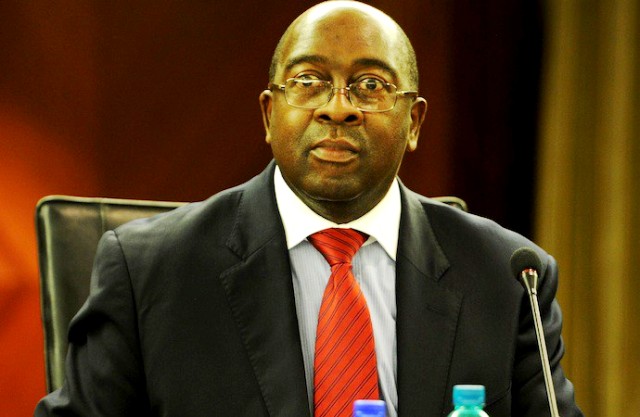The 2015 Budget Speech……. Read It All Here

Finance Minister Nhlanhla Nene took to the Parliament to present his Budget Speech for the first time. The proceeding took place today, 25 February 2015.
Of the highlights: He announced an increase in personal tax, fuel levies, sin taxes and a substantial hike in the Road Accident Fund (RAF) and its fuel levy. He also announced that personal income tax would go up by one percent for tax payers earning more than R181,900 a year.
Read The Full 2015 Budget Speech…….
Honourable Speaker
I have the honour to present the first budget of our fifth democratic Parliament.
Members of the House, and fellow South Africans -Over the past twenty years we have built houses, delivered water and electricity, improved access to schools and health care. Yet there are people living in shacks, there are schools without sanitation, there are patients without care.
We have made progress in dismantling apartheid divisions. Yet there are still fault-lines across our social landscape. We have agreed on a National Development Plan. But there is still hard work ahead in its implementation. Though we continue to register positive growth rates, many businesses have struggled to maintain profitability, unemployment remains high and government has had to adjust to slower revenue growth.
Today’s budget is constrained by the need to consolidate our public finances, in the context of slower growth and rising debt.
And so we must intensify efforts to address economic constraints, improve our growth performance, create work opportunities and broaden economic participation. We need to achieve these goals if our National Development Plan is to be realised.
On the one hand, our development path is limited by the resource constraints of the current economic outlook. On the other hand, it seeks to lift these constraints by strengthening public institutions, investing in infrastructure and our people, supporting innovation and making markets work better. The 2015 budget is aimed at rebalancing fiscal policy to give greater impetus to investment, to support enterprise development, to promote agriculture and industry and to make our cities engines of growth.
Strategic priorities for growth and development
As outlined by President Zuma in the State of the Nation Address on the 12th of February, Cabinet has agreed on nine strategic priorities to be pursued this year, in partnership with the private sector and all stakeholders. They include:
• Resolving the energy challenge,
• Revitalising agriculture,
• Adding value to our mineral wealth,
• Enhancement of the Industrial Policy Action Plan,
• Encouragement of private investment,
• Reducing workplace conflict,
• Unlocking the potential of small enterprises,
• Infrastructure investment, and
• Support for implementation of the National Development Plan through indepth, results-driven processes, known as phakisa laboratories. The first of these laboratories focused on the oceans economy, including off-shore oil and gas exploration and aquaculture opportunities. Already this has led to investment of R9.6 billion in Saldanha Bay.
Strategies for improving primary health clinics have also been developed through a phakisa process. The mining sector will be next. These processes draw widely on the talents and expertise of South Africans, from the public and private sectors, and the scientific and research community.
In each of these areas, there are many programmes and interventions underway, and numerous stakeholders and institutions involved. Members of the House will appreciate, however, that having a plan and a series of activities is not enough.
Intensive effort has to go into the details of implementation, understanding the risks and opportunities of changing market conditions as well as identifying institutional and financial options.
There are many possible plans and priorities: the challenge of governance is to choose wisely between competing alternatives. The budget plays a role in clarifying these options, probing their costs and assessing implementation modalities. It seeks to allocate resources systematically and fairly. This year, we received around 400 tips from fellow South Africans on the budget.
Quite rightly, there are two main areas of concern.
• Many people have concerns about public service delivery. For example, Asif Jhatham advises that municipalities should follow SARS in adopting electronic payments systems. Marc de Chalain appeals for an improved work ethic and pride in a job well done in the public service. Mpumelelo Ncwadi suggests that youth-owned cooperatives should be supported to produce lettuce and herbs for local hospitals and schools.
• And then there is much advice to me on tax matters. Christopher Pappas suggests that fast foods should be subject to sin tax. Mandy Morris says it is time VAT was increased to 15 per cent. On the other hand, Thabile Wonci proposes that young professionals should be exempt from tax for at least one year of work.
Honourable Speaker, I will return shortly to these tax questions.
The budget documents I table today are designed to make our budget choices and their implications transparent. The processes which follow in this House, bringing medium term plans and programmes under the scrutiny of portfolio committees and subjecting Ministers and officials to Parliamentary accountability, are essential disciplines in the translation of plans into service delivery programmes. And so in presenting this Budget to Members of the House, I am obliged to caution that it again comprises a weighty set of documents and explanatory papers. Members who feel that the burden of after-hours reading is excessive are referred to my predecessors, Minister Gordhan and former Minister Manuel, who oversaw the of these instruments of accountability.
Thankfully their advice to me is that it does not all have to be incorporated into the budget speech.
Allow me therefore to recommend this year’s Budget Review for the further attention of Members. It is somewhat differently structured from the past. There is a new chapter on the financial position of public sector entities, and an annexure on progress in infrastructure spending.
Economic context
I turn now to the economic context within which the budget has been prepared. Global economic growth is expected to remain sluggish over the period ahead, rising from 3.3 per cent in 2014 to 3ó per cent this year. There is considerable variation in economic performances between countries and economic trends are likely to be volatile. In the United States, 3.6 per cent growth is expected this year, but in Europe the outlook remains weak, and could still be destabilised by disagreements between debtor and creditor nations. In emerging markets and developing economies, growth of about 4ó per cent is expected. China’s growth is expected to slow to 6.8 per cent this year. Amongst our neighbours in Africa, the recent shifts in commodity prices will benefit some countries and disadvantage others.
South Africa will benefit from the lower oil price, but our major commodity exports have been negatively affected by the global slowdown. Our deepening trade and investment links with sub-Saharan Africa continue to offer favourable growth prospects. Exports to Africa grew by 19 per cent in 2013 and 11 per cent in 2014. However, our primary challenge is to deal with the structural and competitiveness challenges that hold back production and investment in our economy.
The most important of these is the security and reliability of energy supply. Electricity hold back growth in manufacturing and mining, and also inhibit investment in housing and raise costs for businesses and households. Mainly for this reason, our projected economic growth for 2015 is just 2 per cent, down from 2.5 per cent indicated in October last year. We expect growth to rise to 3 per cent by 2017. Consumer price inflation peaked at 6.6 per cent in June last year.
It has subsequently declined to just 4.4 per cent last month, and is expected to average 4.3 per cent in 2015, laying a foundation for economic growth. Higher growth is possible, if we make good progress in responding to the electricity challenge or if export performance is stronger. The best short-term prospects for faster growth lie in less energy-intensive sectors such as tourism, agriculture, light manufacturing and housing construction. These are also sectors that employ more people, and so they contribute to more inclusive growth. Efforts to support these sectors have to be intensified.
Progress in agriculture and manufacturing employment requires a constructive labour relations environment, and well-targeted support for emerging enterprises. While the manufacturing sector has largely underperformed in recent years, there has been an encouraging growth in investment since 2010, particularly in upgrading machinery and equipment. The turnaround in footwear and textiles is also welcome, and should boost job creation over the period ahead. In agriculture we have seen investment and export growth in horticultural products such as grapes, citrus and tree nuts.
Tourism and related services, oil and gas development, communications and information technology also offer many opportunities. Although our fiscal position is constrained, there are considerable financial strengths on which South Africa’s growth strategy can build.
• Interest rates have remained moderate, which reflects the credibility of fiscal and monetary policy and the favourable inflation outlook. The capital market rates at which government and the corporate sector borrow have declined over the past year, signalling continued investor confidence in the South African economy.
• The exchange rate depreciated by 11 per cent against the US dollar in 2014, after declining by 15 per cent in 2013. This coupled with low inflation contributes to our trade competitiveness, and partially offsets the deterioration in commodity prices.
• Our banks and other financial institutions are well-capitalised. South Africa has a buoyant capital market, is open to foreign investors and is a major contributor to foreign direct investment elsewhere in Africa. Our company law and tax frameworks are robust, and we have excellent property market institutions.
The first phase of implementation of the National Development Plan is elaborated in Government’s medium term strategic framework. If we remain united and energized around its implementation – government, labour, business and all South Africans – we will continue to make progress towards a just and prosperous future.
Budget framework and fiscal policy
A sound budget framework is one of the enabling conditions for implementation of the National Development Plan. It has now been eight years since the global financial crisis began. In responding to low economic growth, government allowed for continued expenditure growth and a wider budget deficit to cushion the economy from a potential hard landing, resulting in an increased debt burden on the state. Fiscal room created during the economic boom leading up to the financial crisis cushioned against tax increases as a first response.
Our fiscal rebalancing has included cost containment measures and intensified efforts to improve efficiency in expenditure. These measures are yielding positive results. However, growth performance remains weak and substantial repayments of debt are becoming due. It is now clear that we can no longer postpone consideration of additional revenue measures. In choosing amongst our tax options, the financial health of households and businesses is a primary consideration.
As indicated in the Medium Term Budget Policy Statement, the key features of the budget framework for the period ahead are as follows:
• A reduction in the main budget expenditure ceiling of about R25 billion over the next two years, compared with the 2014 Budget baseline,
• An increase in taxes amounting to R17 billion in 2015/16,
• Revised spending plans across the whole of government, aimed at greater efficiency, reduced waste and an improved composition of spending,
• A consolidation of government personnel numbers, and
• Financing of state-owned companies, where required, without raising national government’s budget deficit.
In the budget framework tabled today, a consolidated deficit of 3.9 per cent of GDP is projected for 2015/16, falling to 2.5 per cent in 2017/18.
Consolidated non-interest expenditure will rise from R1.123 trillion this year to R1.4 trillion in 2017/18, which is an average real increase of 2.1 per cent a year. The share of personnel compensation is projected to remain about 40 per cent of noninterest spending. Interest on state debt will rise from R115 billion this year to R153 billion in 2017/18.
Reductions in budget allocations have been targeted at non-critical activities. Cost containment and reprioritisation measures will limit growth in allocations for goods and services to 5 per cent a year. Spending on catering, entertainment and venues is budgeted to decline by 8 per cent a year, travel and subsistence will be cut back by 4 per cent a year, in real terms. But allocations for critical items such as school books and medicine, for police vehicles’ fuel and for maintenance of infrastructure, will grow faster than inflation.
Compliance will be reported by the Auditor-General.
The budget framework includes an unallocated contingency reserve of R5 billion next year, R15 billion in 2016/17 and R45 billion in 2017/18. This could allow for new spending priorities to be accommodated in future budgets. It takes into account that the economic outlook is uncertain and that both weaker growth and rising interest rates are possible over the period ahead. We are also mindful that public service salary negotiations have still to be concluded. We hope that agreement will be reached in time for salary improvements to be implemented in April.
Over the next three years, government’s gross debt stock is projected to increase by about R550 billion, to R2.3 trillion in 2017/18. Redemptions on debt issued over the past decade will add R190 billion to the medium term borrowing requirement. Net loan debt of the national government is expected to stabilise at less than 45 per cent of GDP in three years’ time. South Africa’s liquid capital market and our standing in international markets enable us to meet this borrowing requirement. But we are mindful that debt sustainability requires a prudent budget framework and improvements in both saving and investment.
Our fiscal policy stance recognises that state-owned companies and municipalities will continue to face substantial investment requirements over the period ahead. Moderation in the main budget deficit creates space in the wider capital market for infrastructure financing of both the wider public sector and private businesses. In addressing these and other fiscal challenges, government is firmly resolved to steer a responsible and sustainable course.
Medium term expenditure and the division of revenue
Honourable Speaker, our Constitution requires an equitable division of nationally collected revenue between national, provincial and local government. This is set out in the Division of Revenue Bill and its accompanying Explanatory Memorandum. The allocations are explained in the Budget Review and elaborated in the Estimates of National Expenditure.
In preparing these proposals, we have benefited from recommendations of the Financial and Fiscal Commission and Parliament’s committees. As is required by section 7 of the Money Bills Amendment Procedure and Related Matters Act of 2009, a report is included in the Budget Review which responds to concerns raised by the finance and appropriations committees, and in portfolio committees’ budgetary review and recommendation reports. We greatly appreciate these contributions of Parliament to the rigour and integrity of our budget process.
The national share of non-interest expenditure is about 48 per cent, provinces receive 43 per cent and 9 per cent goes to municipalities.
Allocations to basic services provided by municipalities have been prioritised, despite the constraints of the budget framework. A new approach is proposed for cities, to support their growth and restructuring and strengthen infrastructure investment. A review of local government infrastructure grants is in progress, which will lead to simplification and consolidation of the financing arrangements.
Over the longer term, progress in municipalities requires local economic growth, property development and revenue capacity, alongside national support. These are key elements in the “back to basics” municipal development strategy.
Economic development
Honourable Members, our support through the budget for economic development is wide-ranging, as it must be if we are to diversify our growth and broaden participation. Innovation and technology change are at the heart of this development strategy. Support for the oceans economy has been allocated R296 million over the next three years. This will enhance our climate change research and management of ocean resources. South African science and technology also continues to benefit from our leading role in the Square Kilometre Array astronomy partnership, which will spend approximately R2.1 billion over the next three years. Minister Pandor is guiding our science councils towards more effective partnerships with industry and academic institutions.
R2.7 billion has been allocated over the medium term under the Mineral Policy and Promotion programme to promote investment in mining and petroleum beneficiation projects. R108 million has been allocated for research and regulatory requirements for licensing shale gas exploration and hydraulic fracturing.
Government will continue to strengthen support for agricultural development and trade, under Minister Zokwana. The projected conditional allocation to provinces over the medium term is R7 billion. Access of emerging farmers to finance will be expanded, in collaboration with the Land Bank.
Since the inception of the recapitalisation and development programme in 2008, 1 459 farms have been supported, and 4.3 million hectares has been acquired for redistribution. A further 1.2 million hectares will be acquired over the next three years, and R4.7 billion is allocated for recapitalisation and development of farms. Establishment of the Office of the Valuer-General in Minister Nkwinti’s department will assist in the orderly implementation of land acquisition and redistribution activities.
CLICK HERE FOR PART TWO : THE BUDGET SPEECH CONTINUES ………




